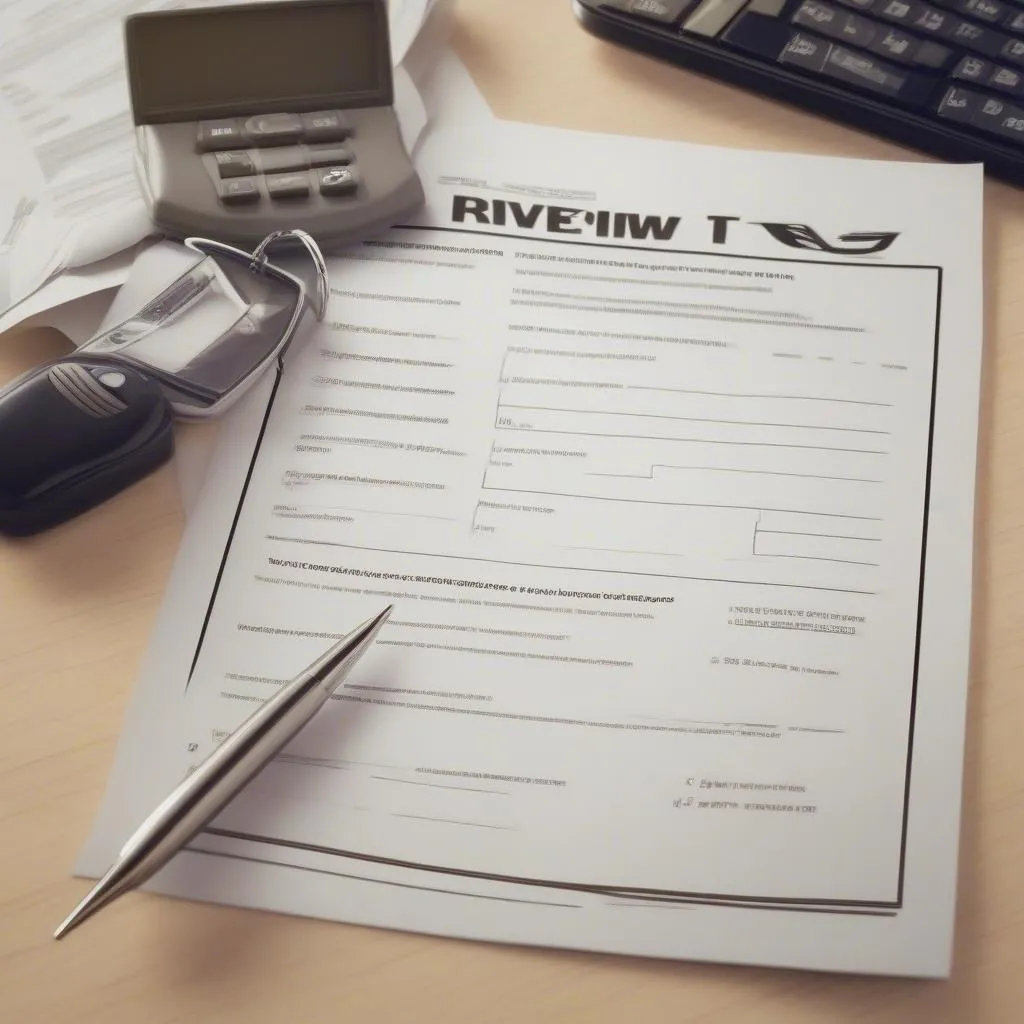Imagine this: you’ve found the perfect car, a sleek black sedan with all the features you’ve been dreaming of. You’ve negotiated a great price, and you’re ready to drive it home. But wait! There’s a mountain of paperwork you need to sort through before you can even turn the ignition. This isn’t just a formality; it’s crucial to protect your interests as a buyer.
Understanding The Importance of Car Buying Paperwork
For many people, buying a car is the biggest financial decision they make outside of a house. This is why the paperwork is so important. From a technical standpoint, these documents legally transfer ownership of the vehicle and safeguard you from potential issues like fraud. From a practical standpoint, they detail the terms of the deal, including the purchase price, financing options, and any warranties or guarantees.
The Essential Car Buying Documents
Here’s a breakdown of the vital documents you’ll encounter during the car buying process:
Title & Registration
- Title: This document proves ownership of the car. It includes details such as the Vehicle Identification Number (VIN), make, model, year, and the current owner’s name.
- Registration: This is proof that the car has been legally registered with the state. It includes the license plate number, expiration date, and other essential details.
Bill of Sale
This is a legally binding document that details the terms of the sale. It typically includes the following:
- Seller’s Name & Address: This confirms the seller’s identity.
- Buyer’s Name & Address: This confirms the buyer’s identity.
- Vehicle Description: This includes the VIN, make, model, year, and odometer reading.
- Purchase Price: This is the agreed-upon price.
- Payment Method: Whether the car is being paid for in cash, financing, or a combination.
- Date of Sale: This is the date the deal was finalized.
Financing Agreement (If Applicable)
If you’re financing the car, you’ll need to sign a financing agreement with the lender. This document outlines:
- Loan Amount: The total amount borrowed.
- Interest Rate: The cost of borrowing the money.
- Loan Term: The length of the loan.
- Monthly Payment Amount: The amount you’ll pay each month.
Warranty Information
This is where you’ll find details about any warranties that come with the car. This could include:
- Manufacturer’s Warranty: This is a warranty provided by the automaker that covers defects in materials and workmanship.
- Extended Warranty: This is an optional warranty that can extend the coverage provided by the manufacturer’s warranty.
What to Look For in the Paperwork
Be sure to carefully review all of the documents before signing. Here are some key points to look for:
- Accuracy of Information: Verify that all of the information on the documents is accurate, including the VIN, make, model, year, odometer reading, and purchase price.
- No Missing Information: Make sure that all of the required fields are filled out.
- Legible Signatures: All signatures on the documents should be legible and clear.
- Complete Understanding: Ensure you understand all of the terms and conditions outlined in the documents. Don’t hesitate to ask for clarification on any confusing aspects.
Tips for Buying a Used Car
Buying a used car can be a great way to save money, but it’s essential to be extra cautious. Here are some additional tips to keep in mind:
- Get a Pre-Purchase Inspection: Before you commit to buying a used car, have a qualified mechanic perform a pre-purchase inspection. This will help you identify any potential problems that may not be apparent during a test drive.
- Check the Vehicle History Report: A vehicle history report can provide valuable information about the car’s past, including accident history, previous owners, and any outstanding liens.
- Consider the Mileage: The higher the mileage, the more wear and tear the car has likely experienced.
Questions To Ask
Don’t be afraid to ask questions. It’s your right as a buyer. Here are some common questions to ask:
- What is the condition of the car?
- Has the car ever been in an accident?
- Has the car been regularly serviced?
- Are there any known issues with the car?
- What is the warranty coverage?
- What are the financing options available?
Avoiding Common Pitfalls
- Don’t Sign Anything You Don’t Understand: Never sign any documents without reading and understanding everything in them. If you have any questions, ask for clarification before signing.
- Be Wary of High-Pressure Sales Tactics: If you feel pressured to make a decision, walk away. A reputable car dealership won’t pressure you into a sale.
- Don’t Be Afraid to Negotiate: Don’t be afraid to negotiate the price of the car, financing terms, and any other aspects of the deal.
Additional Resources
 Car Buying Paperwork Checklist
Car Buying Paperwork Checklist Car Buying Tips & Guide
Car Buying Tips & Guide
Contact Us For Expert Assistance
At Tech Car USA, we understand the importance of navigating the car buying process with confidence. If you need help with any aspect of the process, our team of experts is available 24/7 to answer your questions. Contact us via Whatsapp at +84767531508.
We’re here to guide you through every step of the way!